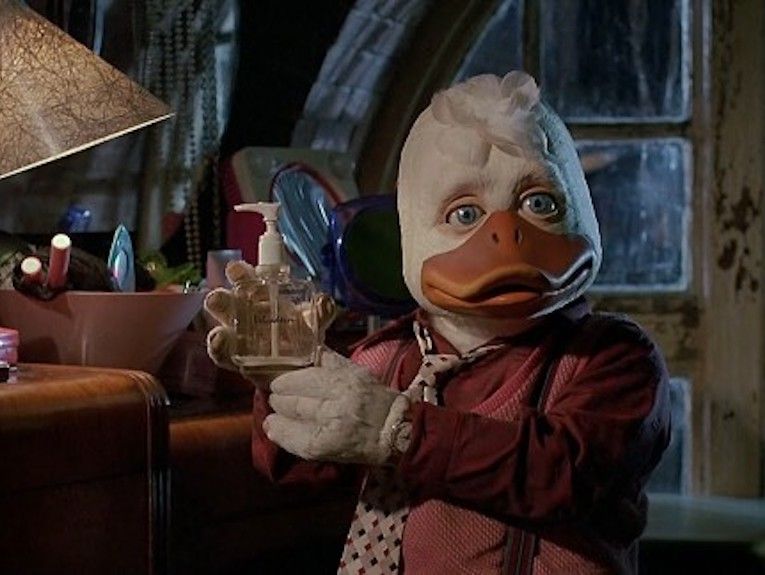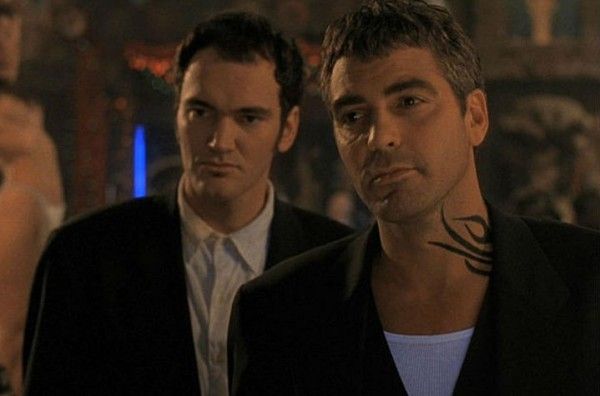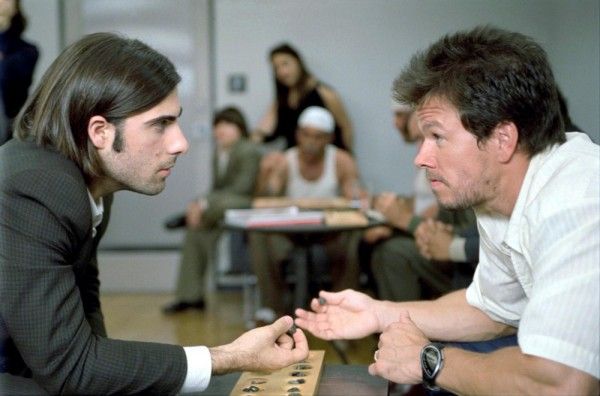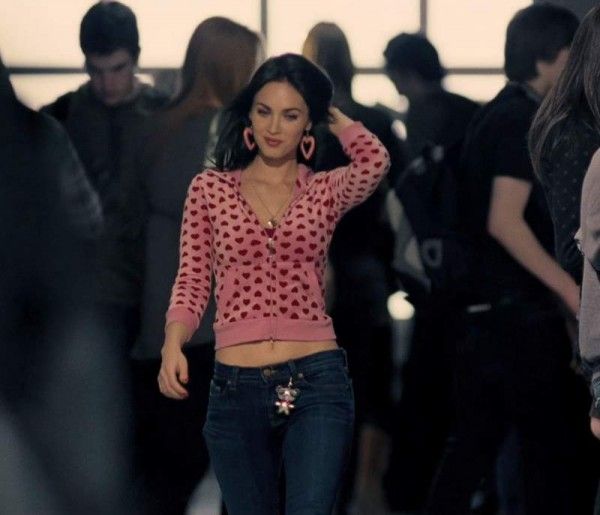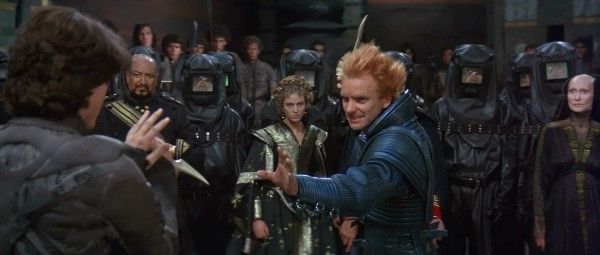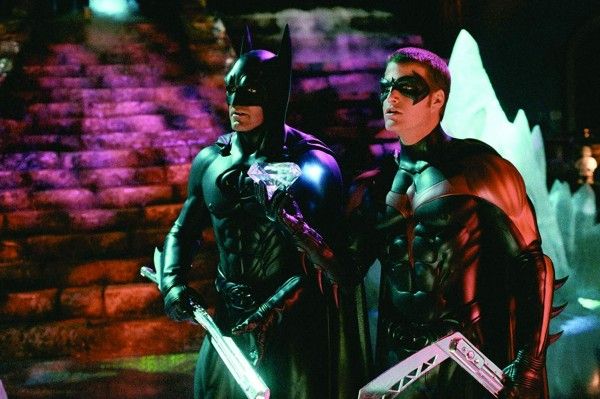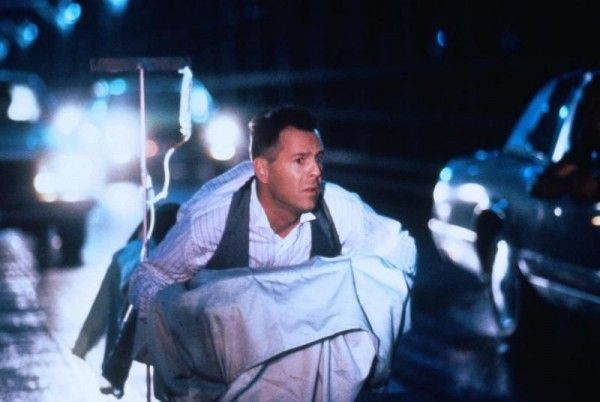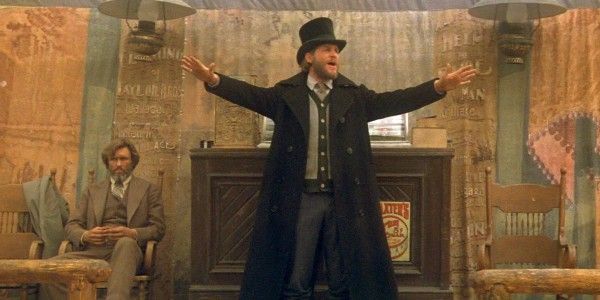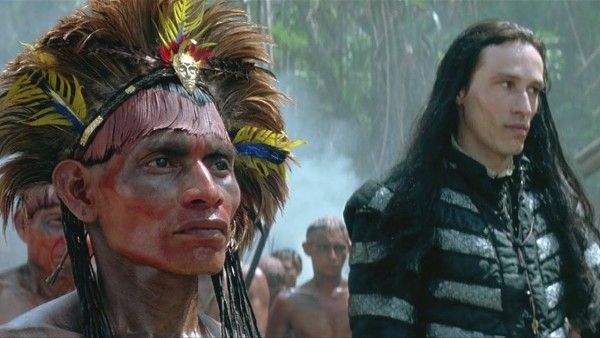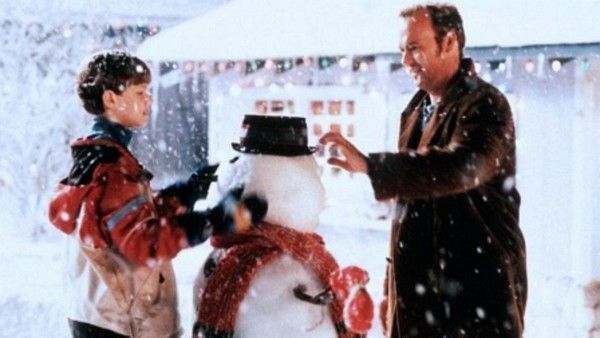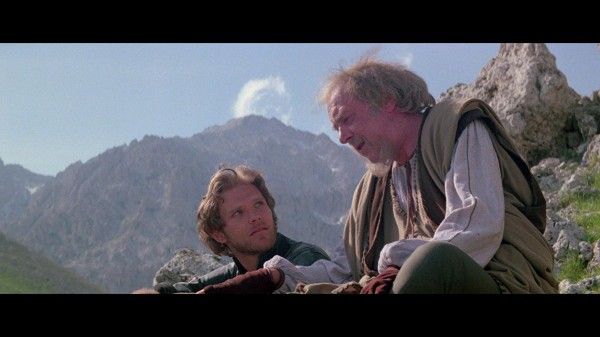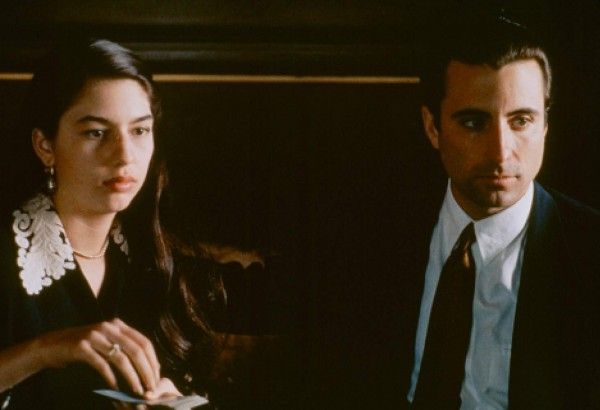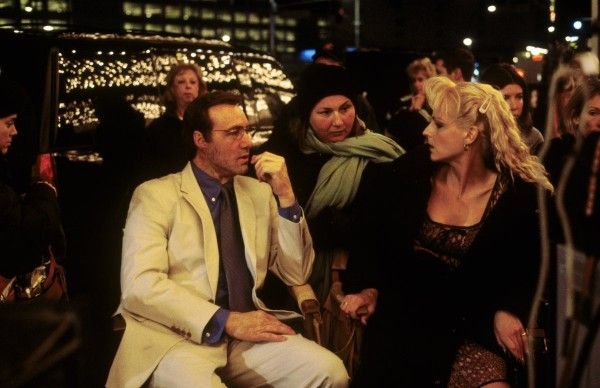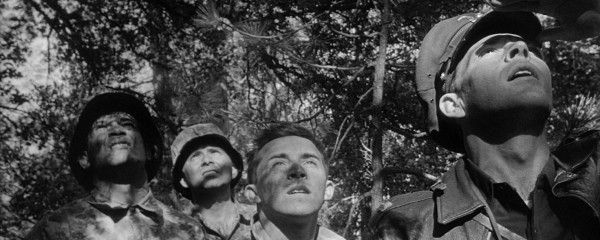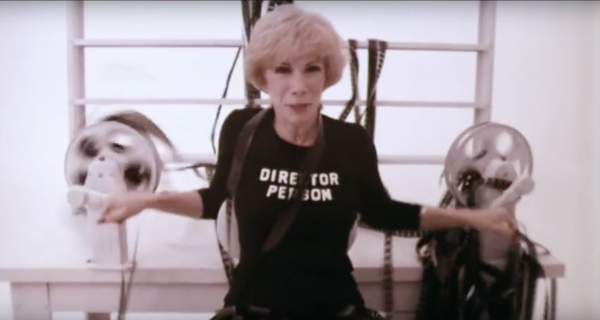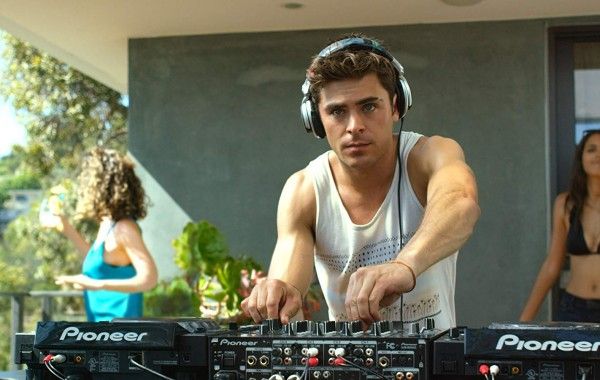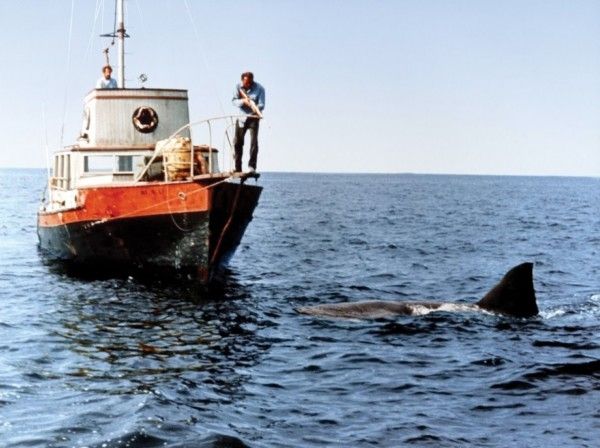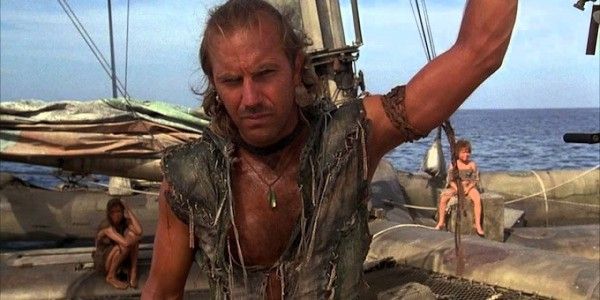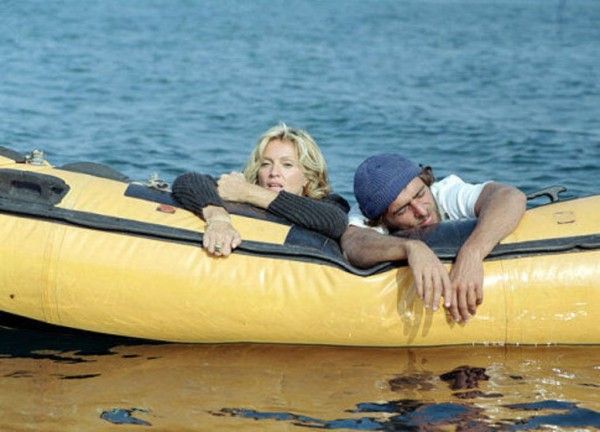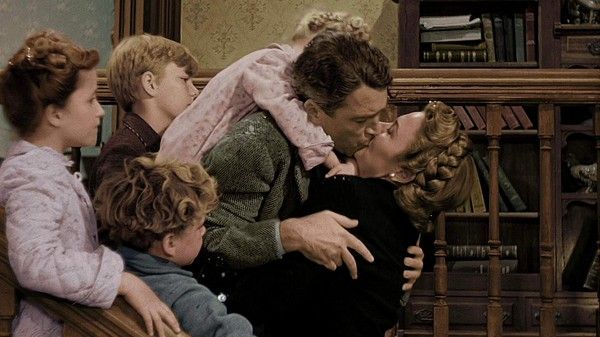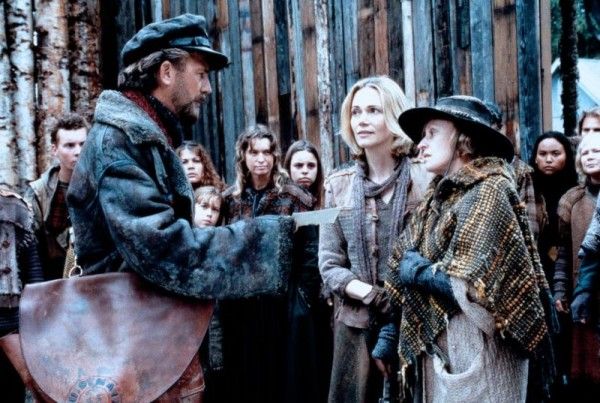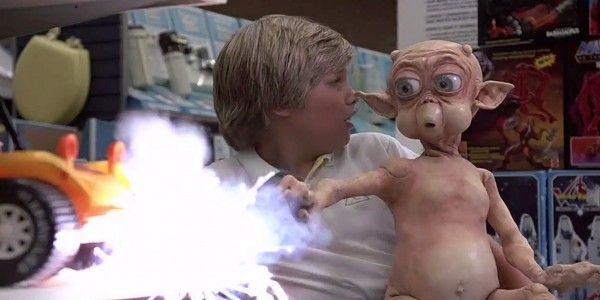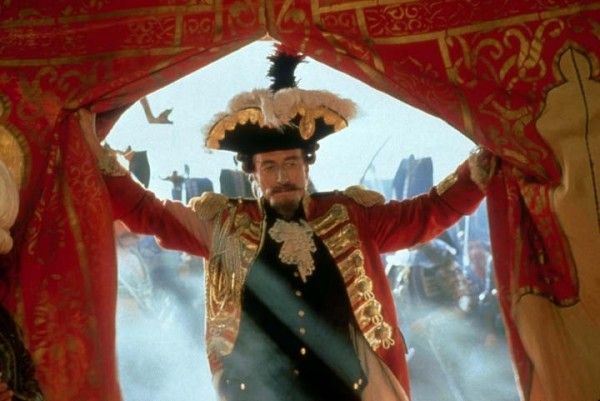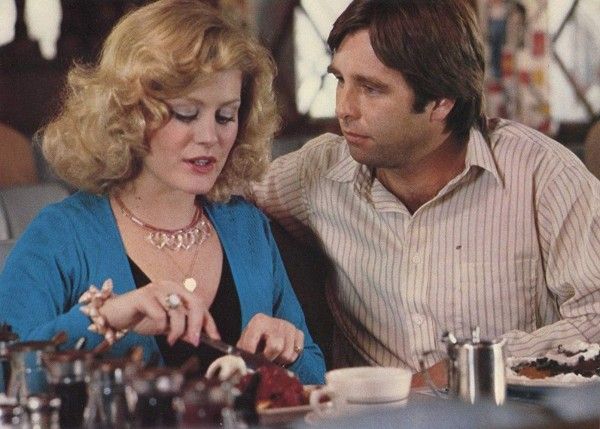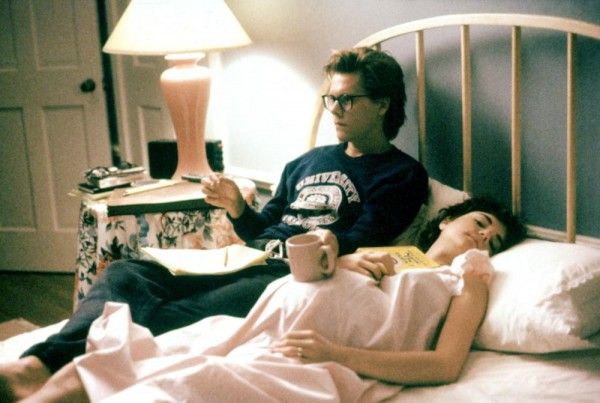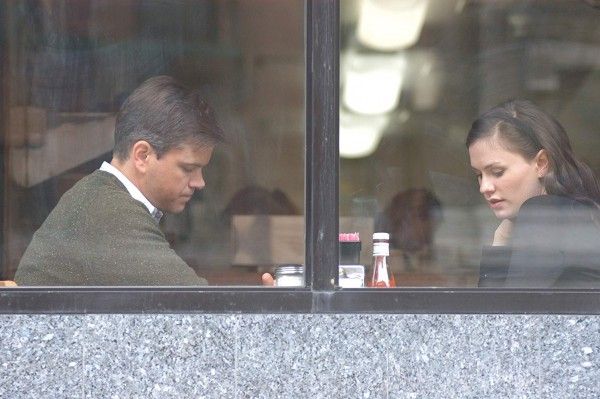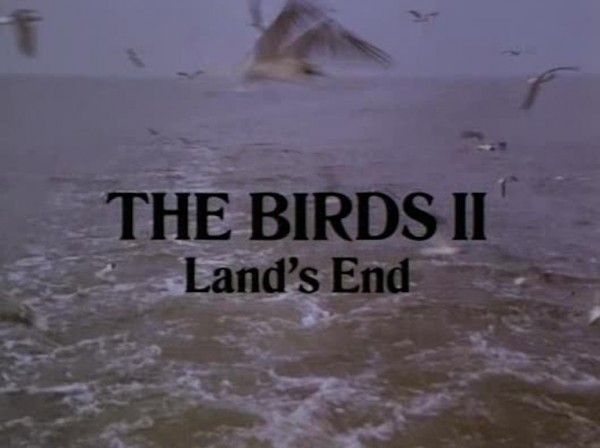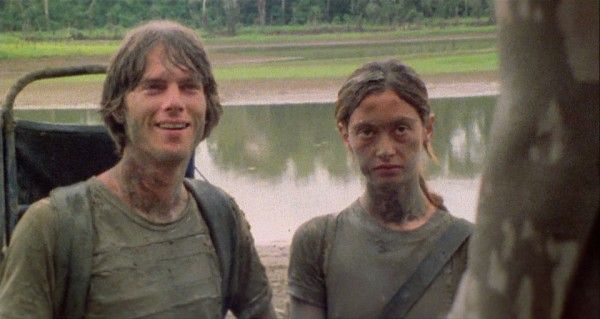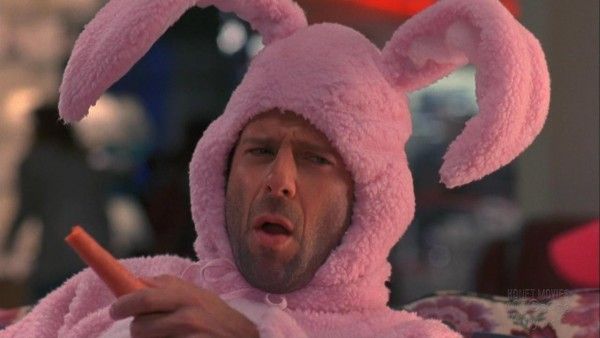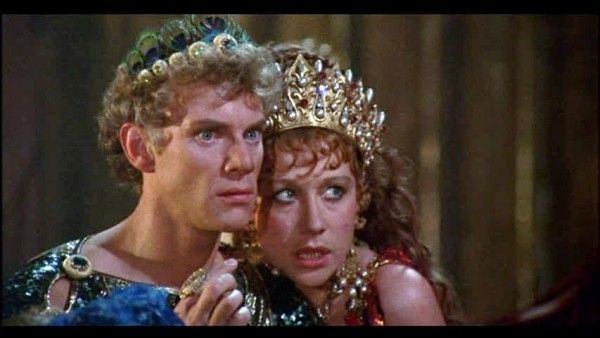From Dusk Till Dawn, Quentin Tarantino
Although Quentin Tarantino didn’t direct this gory vampire flick, he wrote the script and co-starred in it (alongside George Clooney, at the beginning of his movie career). A tribute to B-movie horror films, From Dusk Till Dawn, would later become a cult classic and its status was cemented by Tarantino and director Robert Rodriguez’s 2007 follow-up, Grindhouse.
But at the time, the critics hated From Dusk Till Dawn. The New York Times called it “sophomoric,” the Washington Post said it was a “monument to its own lack of imagination” and the Hollywood Reporter called it “trash.” Tarantino had just come off the successful films Pulp Fiction and Jackie Brown, but wouldn’t direct again until 2003’s Kill Bill.
I Heart Huckabees, David O. Russell
These days, we know David O. Russell mostly for his beloved hits The Silver Linings Playbook and American Hustle. But before that, he directed I Heart Huckabees, which almost ruined his career. The movie failed at the box office, which is pretty unforgivable with Brad Pitt in your cast.
Worse, Russell was surreptitiously filmed yelling at the cast the crew behind the scenes and gained a reputation for being difficult on set. Luckily for him, his previous successes Flirting with Disaster and Three Kings helped give him a second chance, and he’s been going strong since Silver Linings in 2010.
Jennifer’s Body, Karyn Kusama
Written by indie darling Diablo Cody, Jennifer’s Body is another instance of a misunderstood horror movie. Meant to be a feminist take on a fun genre, it was instead marketed—against its creators’ wishes—as a movie for guys who like hot chicks.
Unfortunately, director Karyn Kusama’s prior movie, Æon Flux, had also massively underperformed, and Kusama never directed a feature-length film again. However, like Mimi Leder, she was able to build a successful career as a TV director, directing such dramas as The Man in the High Castle and Halt and Catch Fire.
Dune, David Lynch
It’s every director’s nightmare to make a movie that’s ultimately famous for being a failure, and Dune definitely fits the bill. Called “universally hated when it premiered” by The Atlantic, it’s considered a cult classic both by those who love to hate it and those who think it’s actually pretty good.
After it premiered, David Lynch removed his name from some versions, blaming the sci-fi film’s problems on the studio not allowing him enough artistic control or a final cut on the film. Sting’s acting career was over as soon as it began, but Lynch went on to release Blue Velvet two years later.
Batman & Robin, Joel Schumacher
A Batman movie starring George Clooney as Batman and Arnold Schwarzenegger and Uma Thurman as the villains should have been a slam dunk. And although folks flocked to the theaters on the opening weekend of Batman & Robin, they quickly found out how bad the movie turned out to be, and audience numbers took one of the biggest dives in history.
Easily the worst movie in the Batman franchise, many also consider it to be one of the worst superhero movies ever made, and even George Clooney has said it’s one of his least favorite films he has made. Studios were afraid to touch Batman again until 2005’s Batman Begins, but Schumacher remained relatively unscathed.
Hudson Hawk, Michael Lehman
One of the most infamous flops of all time, Hudson Hawk was supposed to be a rip-roaring comedy-action film the likes of Beverly Hills Cop and Die Hard. It even starred Bruce Willis in the title role, as a cat burglar tasked with stealing priceless artwork.
Unfortunately, it wasn’t particularly funny. Like watching the spoof reel of a war film, the parts that were parody didn’t seem to jive with the brutality of the action. And its bloated Hollywood budget meant that it didn’t even make back a third of what it cost. Director Michael Lehmann took a hit but was back a few years later with the likable comedies Airheads and The Truth About Cats and Dogs.
Heaven’s Gate, Michael Cimino
After his massive hit The Deer Hunter, which earned him an Academy Award for Best Director, Michael Cimino was practically the king of Hollywood. Unfortunately, Heaven’s Gate, his next film, was such an unimaginable disaster that it even caused the collapse of its studio, United Artists.
Bringing in less than 8 percent of its budget once it was released, the movie was not only a box-office failure, it was riddled with rumors about Cimino’s mean behavior on set, including animal cruelty. Cimino did work again–most notably on Sunchaser which was nominated for the Palme d'Or at the Cannes Film Festival in 1996–but his post–Heaven’s Gate career was never the same. However, in 2012, a re-edited version of Heaven's Gate was met with enthusiasm by critics and received a standing ovation at the Venice Film Festival.
1942: Conquest of Paradise, Ridley Scott
One of the biggest box office disappointments of all time, 1942: Conquest of Paradise only made back 15 percent of its bloated blockbuster budget. It starred a French actor (Gerard Depardieu) as Christopher Columbus, was panned by critics, and worst of all, came out just weeks after a nearly identical film, Christopher Columbus: The Discovery.
Any other director might be a Hollywood goner after such a flop, but Ridley Scott is no ordinary director. Considered one of the best in the business, he already had such hits as Alien and Blade Runner under his belt, and he went on to direct many more, like Gladiator, Black Hawk Down, and The Martian.
Howard the Duck, George Lucas
A Marvel movie directed by George Lucas? It sounds like a great idea, but when it happened, with 1986’s Howard the Duck, it was one of the biggest box office disasters of all time. Viewers simply didn’t connect with the duck from outer space who hits on Lea Thompson, and the movie never made back what it had cost to produce.
As a result, Lucas, who was already in debt because of the recent creation of his Skywalker Ranch, ended up selling off part of his company to Steve Jobs. But this story has a happy ending! That sliver of Lucasfilm ended up becoming Pixar, which produced some of the best animated films of all time.
Jack Frost, Troy Miller
Jack Frost was always one of those movies whose schlocky premise sounded like it could be hard to pull off: a kid’s father, who is killed on Christmas Day, plays a magic harmonica and brings his dead father back to life in the form of a snowman (voiced by Michael Keaton) who makes a lot of jokes about things like his frozen balls.
The movie was one of the greatest box office bombs of the actor, and Keaton’s career took years to recover. Miller went back to TV, however, directing Mr. Show with Bob & David, Parks & Recreation, Arrested Development, and many other beloved comedy hits, as well as producing The Academy Awards.
Krull, Peter Yates
A British sci-fi flick that’s considered a cult classic by some and one of the worst movies ever made by others, Krull had all the ingredients of a disaster: a changing script, stunts gone wrong, and a ballooning budget. Almost predictably, it also made a giant thud at the box office.
Peter Yates, who was known for his action-packed, reality-based flicks like Bullitt and his Oscar-winning Breaking Away, reportedly took the film in order to get more experience with special effects. Derek Meddings, who had previously headed up special effects on the Superman films, delivered, with the effects being one of the few parts of the film that wasn’t completely torn apart by critics.
The Godfather Part III, Sofia Coppola
Today, we know her as the director of the beloved indie movie that brought Bill Murray back into the limelight, Lost in Translation. But Sofia Coppola’s career was almost over before it started when she appeared in her father’s final film in the Godfather saga.
While the film got middling reviews, Sofa Coppola’s performance as Mary Corleone was shred to pieces by critics. It was so bad it almost ended her father’s career as well, even though he reportedly made a second cut of the film with many of her scenes cut down. But she continued on in film mostly behind the camera.
Pay It Forward, Mimi Leder
After directing one of the most successful movies ever by a woman, 1998’s Deep Impact, Mimi Leder helmed a movie that’s only gotten worse with age, Pay It Forward. Starring Kevin Spacey as a do-gooder math teacher, it was both a critical and box office bomb.
Although Leder never directed a commercially released film again, she was welcomed with open arms back to television, where she had cut her teeth directing China Beach. Post–Pay It Forward, she’s directed more than 50 episodes of television, winning two Emmys and serving as the co-showrunner of critic-fave The Leftovers.
Fear and Desire, Stanley Kubrick
If you’ve never heard of the Stanley Kubrick film Fear and Desire, there’s a good reason for that: Kubrick himself hated it and tried to keep it from being screened and distributed. His first feature-length film, it got OK reviews but joined the annal of box office bombs.
Kubrick, a working-class photographer, had to go back to odd jobs and making money off chess games in Washington Square to keep himself afloat while he raised money for his next film. There, he would meet producer James Harris, who would become his production partner and path to cinematic success.
Rabbit Test, Joan Rivers
“Rabbit Test” is a term that was given to pregnancy tests back in the day, and it also makes a funny name for Joan Rivers’ first—and last—crack at directing a feature film. About a man who becomes pregnant (played by Billy Crystal), it should have been funny. But it wasn’t.
Rabbit Test was universally reviled by critics, but thankfully Rivers had a rich comedy career to fall back on. After a role in Muppets Take Manhattan, she worked her way back up, appearing in dozens of movies and TV shows, writing books, and becoming the grande dame of red-carpet fashion critique.
We Are Your Friends, Max Joseph
The co-host of MTV’s popular reality show Catfish, Max Joseph did the pilot for the show on a whim for his friend’s brother, Nev Schulman, who had had success with his Catfish documentary. After three seasons of Catfish, Schulman began season four with an announcement: Joseph wouldn’t be joining him because he was off directing his first feature film.
The movie, We Are Your Friends, which starred Zac Efron as an aspiring DJ, was not friends with audiences, with one of the box office bombs in US film opening history. Complex called it “the Lawrence of Arabia of f*cking terrible movies,” but luckily, Joseph only missed half a season of Catfish and the film was never mentioned on-air again.
Jaws Steven, Spielberg
Today, it’s unthinkable that one difficult production could ruin Steven Spielberg’s career. But in 1975, the only big-screen movie Spielberg had directed was the prior year’s The Sugarland Express. The eager young director was wet behind the ears, but he dove into the job. Unfortunately, he was in a bit over his head.
The movie went massively over its production time and over-budget, Richard Dreyfuss’ stuntman couldn’t dive, and worst of all, they couldn’t get the mechanical shark to work. Luckily for Spielberg, Jaws had one of the biggest openings in movie history, setting the standard for summer blockbusters to come.
Waterworld, Kevin Reynolds
Kevin Costner on a post-apocalyptic Earth where the polar ice caps have melted: what could go wrong? It turns out, just about everything, from script problems to a stuntman who was almost lost at sea. "The set wasn’t a three-ring circus, it was a 12-ring circus,” director Kevin Reynolds later told Newsweek.
Widely considered one of the biggest bombs of all time, the movie ran so over budget that it nearly doubled the cost, making it the most expensive movie ever made at the time of its release. However, Costner was mostly blamed and Reynolds continued to direct more forgettable films with eight-figure budgets.
Swept Away, Guy Ritchie
Directing his wife, one of the sexiest women on Earth, in a remake of a frothy Italian classic probably sounded like a good idea to Guy Ritchie. Unfortunately, his 2002 version of Swept Away was a cinematic catastrophe. Madonna’s acting was so universally panned that she never acted again (except in an episode of Will & Grace).
Although critics weren’t much nicer to Ritchie, and the movie was a giant bomb at the box office (bringing in less than $600,000 domestically), the industry was more willing to give the Snatch director a second chance. He’s now best-known for the Sherlock Holmes films starring Robert Downey, Jr.
It's a Wonderful Life, Frank Capra
There was a lot riding on It’s a Wonderful Life, starring Jimmy Stewart and directed by Frank Capra. Everyone had loved the duo’s previous outings, Mr. Smith Goes to Washington and Arsenic and Old Lace, but this would be the first movie that the men made since returning from World War II.
Unfortunately, a bit of bad timing made the flick a flop—it was released just weeks after The Best Years of Our Lives, a serious film about adjusting to a normal life after being at war that would go on to sweep the Oscars that year. Capra’s career never quite recovered in his lifetime, but It’s a Wonderful Life is now famous and Capra is revered as one of the best directors of all time.
The Postman, Kevin Costner
After the waterlogged disaster that was Waterworld, Kevin Costner needed a hit. Unfortunately, The Postman wasn’t it. A mess of a movie—this time about a post-apocalyptic mailman—that Costner starred in while also directing and producing, it was a critical failure as well as a box office one, earning back only 22 percent of its budget.
Costner’s career took a direct blow, but he never stopped acting. Although he never reached his 90s star power again, he pops up regularly in films like Man of Steel and Hidden Figures. He even directed a small movie in 2003 starring Robert Duvall, Open Range.
Mac and Me, Stewart Raffill
A movie so bad it has appeared on Mystery Science Theater 3000, Mac and Me is remembered mostly for its egregious McDonald’s product placement, including a Ronald McDonald–inspired dance number. When director Stewart Raffill came aboard on Mac and Me, the crew was already being paid, but a script still hadn’t been written.
So he wrote it himself on the weekends during pre-production, based off recent hit E.T.: The Extra-Terrestrial. Unfortunately, the script ended up being as bad as the product placement, and the movie became one of the biggest duds of all time. However, Raffill came out mostly unscathed and went back to directing middling Hollywood fare like the sequel Mannequin: On the Move.
The Adventures of Baron Munchausen, Terry Gilliam
Critics and viewers seemed to like The Adventures of Baron Munchausen, but when you’re dealing with a movie that has run a reported $20 million over budget, you’re facing an uphill battle. Director Terry Gilliam was also rumored to be difficult on set, with child actress Sarah Polley calling the experience “traumatic.”
Released during a changeover in management at Columbia Pictures that didn’t get along with Gilliam, it only received a limited release and ended up making back only $8 million. Gilliam kept going, however, and after directing the wildly successful Twelve Monkeys in 1995, no one thought much about Munchausen again.
Honky Tonk Freeway, John Schlesinger
He had won an Oscar for directing Midnight Cowboy, but John Schlesinger was almost done in by Honky Tonk Freeway, an 80s romp. At the time the most expensive comedy ever made, the budget expanded to include such line items as painting almost an entire town pink and trying to get an elephant to water ski.
Audiences didn’t appreciate the cost to make a hilarious safari park come to life, and the comedy crashed and burned. Schlesinger followed up the flop with a couple of TV movies but returned to big screen success with 1985’s The Falcon and the Snowman.
She’s Having a Baby, John Hughes
John Hughes was the king of 80s comedy, having written and directed such hits as Sixteen Candles, The Breakfast Club, and Ferris Bueller’s Day Off. But when he created She’s Having a Baby, the movie that he felt hewed most closely to his life, it bombed.
Still, Hughes had one more classic film left to direct—1989’s Uncle Buck. Not only do many consider it one of John Candy’s best films, but it also stars the 90s child star super duo of Gaby Hoffman and Macaulay Culkin, one year before he starred in Home Alone, which Hughes wrote and produced. She’s Having a Baby might be one of Hughes worst films, but it hardly hurt his legacy.
Margaret, Kenneth Lonergan
Although Margaret premiered in 2011, it was completed in 2005, which tells you a lot about what a troubled production it was. Mired in lawsuits because its studio, 20th Century Fox, couldn’t agree with its director, Kenneth Lonergan, on a cut, by the time it was released Lonergan’s reputation was all but ruined thanks to the disagreement.
Luckily, the writer-director (who had penned Analyze This and Gangs of New York) was well-respected by those who had worked with him, and championing from actors like Matt Damon helped Lonergan land the 2016 movie Manchester by the Sea, which received rave reviews and was a rousing success.
Birds II: Land’s End, Rick Rosenthal
Rick Rosenthal is a prolific TV director, having directed more than 75 episodes of TV dramas and producing dozens more. But in 1994, he directed a TV movie that he wanted no one to know was his: a sequel to Alfred Hitchcock’s The Birds called Birds II: Land’s End.
The Birds II: Land’s End was released on the Showtime network as an “Alan Smithee film,” a pseudonym commonly used by directors who don’t want to be associated with their work. But his name still appeared on promotional materials sent to reviewers, and Entertainment Weekly’s Ken Tucker outed him, saying, "He has good reasons to want his name erased from it. If it were me, I'd sue.”
Cannibal Holocaust, Ruggero Deodato
An Italian horror film with little artistic merit and a crazy amount of graphic violence, Cannibal Holocaust sparked the “found footage” craze popularized years later by The Blair Witch Project, and almost got its director, Ruggero Deodato, thrown in prison for life.
First, Deodato was arrested on obscenity charges in Italy, but that was just the beginning of his troubles. After rumors that the murders depicted in the film were real, he was charged with murder, and wasn’t cleared until the actors themselves showed up in court.
North, Rob Reiner
North stars a pre-Frodo Elijah Wood with Seinfeld’s Julia Louis Dreyfus and Jason Alexander as his parents, so it’s too bad it’s unwatchable. The movie famously inspired one of Roger Ebert’s most-quoted reviews: “I hated this movie. Hated, hated, hated, hated this movie. Hated it.”
Although it ended a string of Rob Reiner classics that are among some of the best romance movies ever made—including The Princess Bride and When Harry Met Sally...—it didn’t finish the lauded director’s career. Instead, he released one of his most beloved films of all time, The American President, the next year.
Caligula, Tinto Brass
Caligula has the dubious distinction of being the only movie ever produced by Penthouse magazine, and cigar-chomping Italian Tinto Brass has the dubious distinction of being its director. After rewriting a script by Gore Vidal and filming most of the film, Brass walked off the set after refusing to film genuine (unsimulated) sex scenes. He disavowed it afterward.
Meant to be a pornographic movie that still had substance and high production, it was not only written by noted intellectual Gore Vidal, it starred Malcolm McDowell, Helen Mirren, and other respected actors. But it was an unmitigated disaster, with critics calling it trash and the film being banned in numerous countries.

